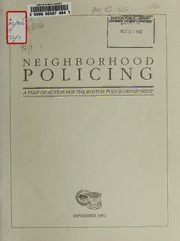
Neighborhood policing: a plan of action for the Boston police department PDF
Preview Neighborhood policing: a plan of action for the Boston police department
BOSTON PUBLJC LIBRARY GO»/ERNMENTDOCUMENTS DEPARTMENT OCT 2 1 1992 4 ! NEIGHBORHOOD POLICING A PLAN OFACTIONFOR THEBOSTONPOUCEDEPARTMENT SEPTEMBER 1992 lUistoii September 15, 1992 Hon. Francis M. Roache Police Commissioner Boston Police Department 154 Berkeley Street MA Boston, 02116 Dear Commissioner Roache: NeighborhoodPolicing:A Plan ofActionfortheBoston PoliceDepartmentprovides a framework, schedule, and list oftasks for converting all operations ofthe BPD to the practice ofNeighborhood Policing, while meeting the basic need ofthe citizens ofBoston for reliable, rapid response to emergency calls for service. The intent and primary focus ofthe plan is to identify the internal actions that must be taken to better position the Department to work in partnership with the neighborhoods ofthe City ofBoston. Crucial to the success of this effort is development ofpolice ofFicers as society's leading problem solvers in the drive to free every neigh- borhood from crime, disorder, and fear. Consequently, this Plan ofAction focuses on readying the Department's infrastructure to support a fully functional partnership with citizens who are determined to strengthen the communities where theylive and work. The next twelve months are the period oftransition. During this period the organization's needs (defined in this report) for equipment, technology, and training will be addressed. The BPD's structure will be reorganized both to decentralize decision making and to ensure newstandards ofaccountability. Asystematic, integrated partner- ship between the public, police, andother agencies will be developed through a planning process that will select and rank problems to be solved, prevent new problems from arising, and define measures for success. And Neighborhood Policingwill begin to be implemented in and around a number ofneighborhood business districts around the city. All the tasks that must be performed in the nextyearwill require a highly cooperative and collaborative relationship with our unions, the academic institutions in and around Boston, and the private and public sector. Full implementation ofthe new policingstrategywill depend on hiringenough officers to stafTall the beats and sectors thatwill be delineated in the next four months byArea and District Commanders workingwith the citizens they serve. NeighborhoodPolicing:A Plan ofActionfirtheBoston PoliceDepartmentis the result ofa thorough self-assessment conducted by task forces comprised ofofficers representing our major unions, the Boston Management Consor- tium, other outside consultants and academic experts, and byofficers from every rank and most major units. A representative sample ofthese (26%) participated in the Department-wide, anonymous, voluntary surveysent to everysworn member ofthe BPD. — We found great strengths particularly in the BPD's long tradition ofneighborhood service, its successful experiences with avariety ofneighborhood-oriented programs, its wide network ofcommunity contacts, and the dedication ofits personnel. The Plan ofAction builds on thesestrengths. Raymond L. Flynn, Mayor/POLICE DEPARTMENl/i54 Berkeley Street 021 16 Hon. Francis M. Roache September 15, 1992 Page 2 — We also found deficits in equipment, technology, training, and a disparity between the readiness ofofficers to embrace the tenets ofNeighborhood Policing and their perception that the media and the residents ofthe city do not understand or appreciate their efforts. The Plan ofAction describes how these problems will be ad- dressed. As you know, the most serious obstacle confronting full implementation ofNeighborhood Policing in Boston is the current inability ofthe city to hire more police officers to meet citizen demands and expectations. Neverthe- less, wewill press forward aggressively and on all fronts to transform the basic operations ofthe Department to support Neighborhood Policingwhile we implement it wherever staffing allows. Neighborhood Policing is an idea whose time has come. Boston is very stronglypositioned to be one ofthe first cities in the nation to redeem its potential. By 1995, when the Department moves into its new $51-million, state-of-the-art headquarters, we hope to have fiilly implemented and staffed this initiative. William Bratton J. Superintendent-in-Chief Digitized by the Internet Archive 2015 in https://archive.org/details/neighborhoodpoliOObost_0 NEIGHBORHOOD POLICING A PLAN OFACTIONFOR THEBOSTONPOUCEDEPARTMENT Raymond L. Flynn Francis M. Roache Mayor Police Commissioner SEPTEMBER 1992 \ Table of Contents The Goal/Building Neighborhoods Without Fear 1 The Vision 1 The Hard Realities 1 The Method 2 The Reason for Hope 2 Chapter One/Executive Summary 3 The Opportunity 3 Fear 4 Definition 4 Operating Principles 4 Partnership, Problem Solving, and the PoliceAre Preventing Crime 5 NX/hy No Major City Has Fully Implemented Neighborhood Policing 6 A Tradition ofService is the Foundation for Change 6 But Basic Systems Still Must Be Rebuilt 6 Recent Studies ofthe Department 6 The Self-Assessment 7 Major Findings ofthe Self-Assessment 7 Resource Limitations 8 The Stages ofChange 9 Level L Securing Basic Service 9 Phase II Leveraging the Investment in Technology 9 Phase III: Implementing Neighborhood Policing 9 Summary 10 Chapter Two/History 11 Stress and Deprivation 11 Restoration Begun 12 Chapter Three/Current Condition 13 Meeting Changing Demand 13 Structure ofthe Organization 16 State ofthe Infrastructure 16 Facilities and Equipment 16 Science and Technology 18 Training 19 Internal Communications 19 Culture ofthe Organization 20 Chapter Four/Strengths 23 The City and its 16 Neighborhoods 23 The Boston Police Department and its Tradition ofNeighborhood Service 25 Team Policing 25 Neighborhood Oriented Policing Program 25 Community Disorders Unit 25 Neighborhood Services Unit and Neighborhood Crime Watch 25 Anti-Gang Violence Unit 26 The Men and Women ofthe BPD 26 Chapter Five/Obstacles 27 Limited Resources 27 Cultural Focus and the Sense ofBeing Unappreciated 27 Accountability and the Chain ofCommand 28 Creating a Clear Meritocracy 28 Lack ofa Perceived Crisis 28 Unresolved RacialAttitudes Throughout Society 29 Chapter Six/The Stages ofChange 31 Level One: Securing Basic Service 31 Providing Rapid Response to Emergency Calls for Service 31 Equipment 32 NewVehicles 32 Firearms 33 Radios 33 Uniforms 33 Decentralization and the Drive to Control Costs 33 Training 33 Level Two: Leveraging the Investment in Technology 34 Computer Aided Dispatch 34 Suspect Identification and Imaging Network 35 A Linked System ofPersonal Computers 35 Case Management 35 Mobile Data Terminals 36 Level Three: Implementing Neighborhood Policing 36 Local Strategies 36 Analysis ofDeployment and Functions 37 Managing for Performance 39 Systems 43 The Matrix ofChange 45
